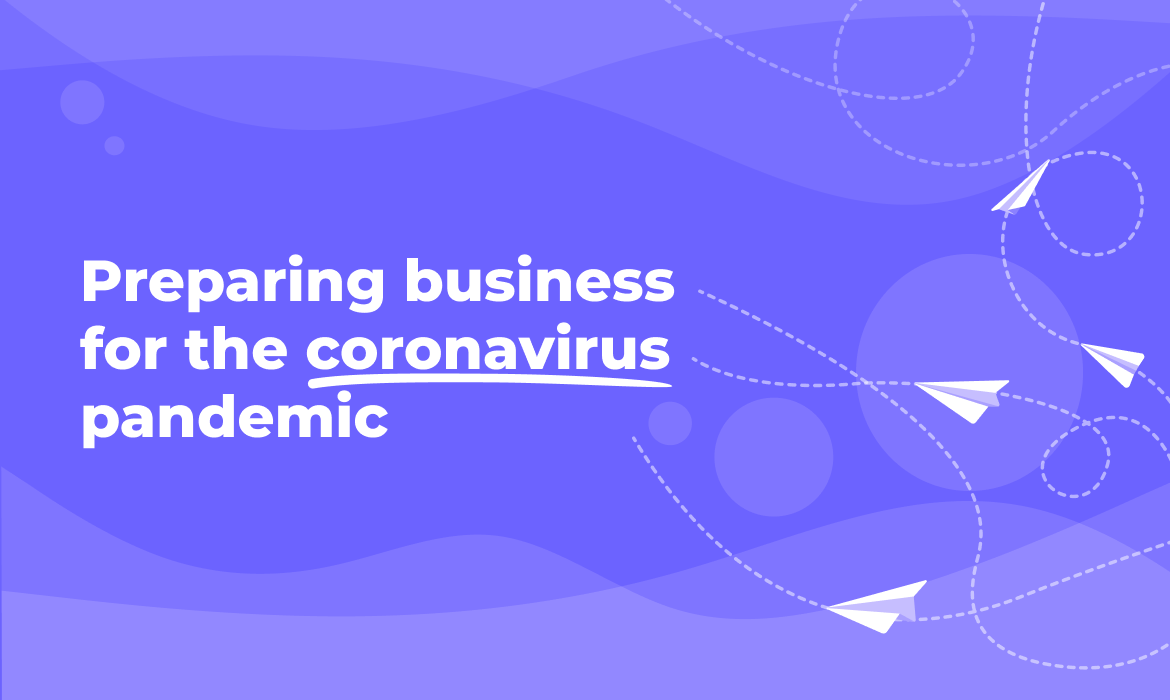On the 11th of March 2020, the World Health Organisation (WHO) declared COVID-19 (the coronavirus) as a pandemic. Your business will feel the ripples cast from a world scrambling to respond to this crisis. Clear leadership, calm heads, and sensible thinking will steer your business through the turbulent few months ahead. Remain alert, but not alarmed.
The coronavirus is a respiratory illness that originated in Wuhan, China. Since being first detected in late 2019, it has spread to every continent in the world except Antarctica, caused the global economy to plummet to levels not seen since the 2008 financial crisis, and spiralled the world’s population into a morbid frenzy of toilet roll panic-buying.
People are worried, and rightly so. But despite going against every fibre of your human instinct, this is no time to panic; especially if you run a business. It’s not too late, there are steps you can take to shield yourself and your business from the virus and its consequences.
Is your business coronavirus-ready?
Your business is important, but never as important as your and your employees’ health. There are several precautions that can be put in place to limit the spread of the coronavirus whilst achieving maximum-possible productivity.
Know the symptoms
According to WHO, the most common symptoms for the coronavirus are fever, lethargy, and a dry cough. Some individuals also experience aches and pains, nasal congestion, and a sore throat. If staff members are experiencing any of these symptoms, they should immediately isolate themselves and seek the advice of the guidelines that apply to their country.
Above everything else, if staff feel ill with these, or any other symptoms, they must not go into work and should stay at home with no exception.
Work from home
If you’re not a remote-friendly company, it’s time to become one. Allowing employees to work from home is one of the simplest, yet most effective ways that a company can combat the spread of the virus. Whilst it might not be possible in some spheres, employees should be sent home with laptops and chargers every night for a smooth transition from office-work to home-work. Technology makes working from home easy.
Believe me, there’s nothing like dialing into a conference call from the comfort of your underpants.
Postpone all non-essential international travel
The Centre for Disease Control and Prevention (CDC) has advised against all non-essential travel to regions that have experienced severe outbreaks, such as China, South Korea, and Iran. More recently, it recommended travellers to avoid all non-essential travel to most countries in Europe.
If any employees have travelled from any country that is on CDC’s list, they should be barred from the office and instructed to isolate themselves for 14-days, with no exceptions.
Put appropriate office-hygiene measures in place
People shouldn’t wear a facemask unless they are already sick; it’s counter-productive to buy them for yourself or your employees. Even if they’re the fancy N95 respirator masks, WHO’s advice is that buying one merely creates a more urgent demand for somebody who needs it.
As expected, there’s a lot of misinformation swirling around around the internet about the coronavirus. It’s best to follow and enforce hygiene advice given by governments or health organisations such as WHO, CDC, or the NHS. Here are some of the hygiene measures that they all agree on…
✔ Regularly wash hands for at least 20 seconds with alcohol-based sanitiser, especially on entering the office. Make sure soap and hand sanitiser is freely available to colleagues and employees throughout the office, especially in bathrooms.
✔ Get rid of sponges and towels in common spaces. These are known to harbour bacteria, encouraging the transmission of diseases such as the coronavirus.
✔ If your office doesn’t have a dishwasher, you should encourage employees to bring their own utensils such as knives, forks, and spoons.
✔ Make sure all spaces are cleaned regularly and thoroughly. This is especially true for known fomites, such as door knobs, buttons for lifts, cupboard handles, water taps, and anything else that is regularly touched.
✔ Encourage staff to cover their mouths with the inside of their elbow when they cough or sneeze. Likewise, make sure they dispose of any tissues they use to blow their nose.
Make sure your employees are aware of these steps and are taking this outbreak seriously. Besides, creating a culture of habitual cleanliness in the office is never a bad thing.
Why is business slowing down?
As far as wide-reaching consequences go, not much beats a global pandemic. Events are being cancelled, supply chains are being interrupted, and, of course, workers are getting sick. Small, medium, and large businesses are all hearing the tills ringing less.
The bottom line is they’re losing money as a result of something that is entirely out of their hands.
Adapt
In times of adversity, the best strategy to take is adaptability. Force majeures like the coronavirus are often met with ignorance. As the effects snowball, ignorance gives way to sense-making, crisis planning, recovery, post-recovery, and eventually reflection and learning. The quicker your business makes it to reflection and learning, the better.
“Master Kong is a leading food manufacturer in China. As the coronavirus dug its heels in, they anticipated hoarding and low stock-counts. So, they tilted their business towards e-commerce and stocked more, smaller stores. Their supply chain had recovered by as much as 50% within two weeks of the outbreak.”
The fastest recovering companies in China were proactive and flexible. They recognised that demand in some spheres was reduced and moved towards the spheres in which it was increased. In the likely event that brick-and-mortar stores are closed down, it’s important to have a strategy in place to get your product to people who need it.
Finally, find opportunity hidden amongst all the adversity.
Reallocate employees to different activities
The political response to the coronavirus has been mixed, at best. Your workforce is looking for leadership. Whilst sales and business development projects are put on ice, it’s important that employees aren’t left out in the cold without anything to do. As a business learns to adapt, its employees must adapt with it.
If customer service and sales teams are twiddling their thumbs, give them some back-end jobs to complete. There’s an internal system that could do with an upgrade somewhere; people around the world have more time to catch up on your red-hot content, so focus on putting it out. If you’re really struggling to find things for your staff to do, don the marigolds, put some tunes on, and do a deep, deep clean of the office.
“Some more creative Chinese companies even loaned their employees out to other enterprises that needed them. Over 40 restaurants, hotels, and leisure complexes lent their not-busy employees to supermarkets who were in need of delivery drivers due to increased demand from online stores.”
The period of time immediately after the coronavirus is going to be absolutely crucial for your business. Only six weeks after the initial outbreak, congestion on Chinese roads has increased by 63% of the levels seen whilst the virus was at its peak. This suggests that recovery might be a lot quicker than you’d expect.
Make sure your company devises a post-recovery plan before expending energy on any other task.
Act locally
The coronavirus is having a huge effect on national and international economies. Whilst this dominates the news and social media, it’s important to remember smaller business. By continuing to go about normal activities as much as possible, such as buying items from smaller retailers, holidaying within your home country, and purchasing services from local professionals and tradespeople, you might save somebody a lot of heartache.
Be ready. It’s not fear-mongering to say that this is a dangerous situation. As a business owner, your employee’s health should be your first priority. If we look after each other, we can pull through this crisis together. It’s not going to be easy, but with the right planning in place and an adaptable mindset, we can limit the consequences.
Remain alert, but not alarmed.

